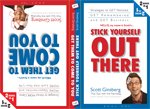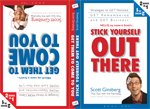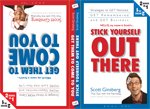 Determination alone fails.
Determination alone fails.
Just watch American Idol. Every one of those kids is determined to become the next international pop sensation.
Too bad their singing voices sound like donkey farts.
HERE’S THE REALITY: Progress is the product of attitude, focus, impatience, imperfection, avoidance and courageous action.
Whether you’re an entrepreneur, salesperson, organizational leader or simply a person who’s tired of sweating it out on the treadmill of life, here are eight ways to move forward:
1. Mind over mattress. Davinci said, “Rouse yourself from sleep because lying down will not bring thee fame.” Ginsberg said, “Lying down will not bring thee forward.” Either way, the suggestion is the same: Wake up earlier.
You’ll get more done. You’ll avoid having to rush. You’ll prevent the need to launch right into your daily tasks. And you’ll activate a sense of momentum that will set the rest of the day into productive motion.
One hour. That’s all I ask. Try it for a month and see how easy it is to move forward. What time did you get up today?
2. Real progress starts with self. You’re waking up earlier. Cool. The next step is to practice winning the private battle before going into the public arena. I’ve been practicing this (daily) since 2002. But I didn’t understand the psychology behind it until I read Principle-Centered Leadership by Steven Covey. He wrote:
“Early morning private victories give you a sense of conquering, overcoming and mastering – and this sense propels you to conquer more public challenges during the day. Starting a day with an early victory over self will lead to more victories.”
Beginning tomorrow, I challenge you to use your first waking hour profitably. After thirty days, you’ll build reserves of emotional stamina to be called on during the inevitable stress that accompanies moving forward. Are you willing to take charge of your own development?
3. Announce your intentions to yourself. Moving forward means architecting a vision, then aligning your daily actions with that vision. Even if you don’t have a plan. Even if you don’t know how to do what you want to do. If you use a compass instead of a map, it’s easier to pinpoint your general direction.
Sure beats killing yourself trying to figure out longitudinal coordinates. Remember: How is not your responsibility. Fall in love with why and how will make its appearance when it’s ready. Like Nietzsche said, “He who has a why to live can bear almost any how.” What are you forgetting to be intentional about?
4. Focus activates progress. Throughout your day, beware of the distraction of the next idea. Shiny object syndrome is executioner of execution and the preventer of progress. Marcus Aurelius addressed this issue a few thousand years ago in Meditations:
“Give not the strongest foothold to anything else. Nothing will sooner prevent your true spirit from flourishing or be more difficult to root out than the distraction of divided loyalty.”
Look: You don’t need more ideas. Pick a lane, crank up the Alpine and drop some lead on the gas. Remember: Moving forward means investing time in things that matter – not burning time trivially persisting on inconsequential wastes of energy. How much time are you wasting (not) focusing on your priorities?
5. Make progress by making peace with inadequacy. Here’s a trend that’s not going away: Finished is the new perfect. As such, progress is a form of accepting. For example:
Accept that you might fail.
Accept that you’re never really ready.
Accept that you don’t need to know how.
Accept that you don’t need a complete script to start shooting.
The sooner you recognize that you’re the only one waiting for you to get everything right, the sooner you can move forward. What is your bottomless need for perfection preventing you from achieving?
6. Listen smarter. The biggest secret to moving forward is closing your ears to people whose toxic noise is holding you back. Don’t listen to people who nastily try to induce insecurity in you. Don’t listen to people whose imagination can’t encompass what it is that you want to do.
Also, don’t listen to people who put a damper on your natural versatility. And don’t listen to people who did something once and think they know everything about it.
People like this undermine your execution. Instead, learn to listen to people whose opinions matter. Surround yourself with a trusted team of life-enhancing high grade people. Spend your time with individuals who are examples of the way you want to live.
Growing bigger ears, after all, means growing more mature ears. Are you listening to people who mindlessly judge you or compassionately honor your perspective?
7. Wage a war against inertia. In The Paradox of Choice, we learned that the desire to avoid regret induces people not to act at all. Barry Schwartz dubbed this principle inaction inertia. So, your challenge is simple: Reduce your number of choices.
If you want to move forward, stop killing yourself trying to pick the best of everything. Stop plaguing yourself with post-decision doubts. And stop exhausting yourself running ridiculous searches of every possibility. Choices cause stress, and stress stops you. According to Schwartz:
“The more choices you have, the longer it takes to commit; the longer it takes to commit, the more you regret and reevaluate every decision after the fact; and the more you regret and reevaluate, the less satisfaction you ultimately receive from the choices you make.”
Eventually, there comes a point of diminishing returns. Eventually, you need to stop choosing and start moving. Remember: When massive resistance is marshaled against you, you’ll never run out of reasons not to choose. Decide anyway. Even when it seems senseless to others. Are you a great chooser?
8. Leap and the net will appear. Lastly, it’s impossible to make progress if your ego is too invested in trying to define what progress looks like. Just start moving. Let your feet do the talking. Progress will define itself for you.
Otherwise you’ll prematurely commit to a false definition of advancement. That assumption functions as an arrogant clamp that closes you off to potential growth opportunities.
I’m reminded of Indiana Jones and The Last Crusade. In the final scene, we see that only when Indy has courage (and faith!) does the path appear before his feet. The cool part is, when he looks back, the path was there the whole time. He just wasn’t tuned into that frequency yet. Are you willing to close your eyes, extend your leg and breathe deeply into the next terrifying step?
BOTTOM LINE: Your hands are tired of being sat on.
If you (really) want to move forward…
Stop sleeping in.
Stop wondering how.
Stop listening to idiots.
Stop striving for perfection.
Stop watching American Idol.
Stop making so many choices.
If action is eloquence, progress is a standing ovation.
LET ME ASK YA THIS…
Why haven’t you moved forward yet?
LET ME SUGGEST THIS…
For the list called, “99 Questions Every Entrepreneur Should Ask,” send an email to me, and you win the list for free!
* * * *
Scott Ginsberg
That Guy with the Nametag
Author, Speaker, Entrepreneur, Mentor
[email protected]
 The world’s FIRST two-in-one, flip-flop book!
The world’s FIRST two-in-one, flip-flop book!
Buy Scott’s comprehensive marketing guidebook on Amazon.com and learn how to GET noticed, GET remembered and GET business!
 Six hours from now, I’ll be taking center stage here in Denver for the Optimist International Convention.
Six hours from now, I’ll be taking center stage here in Denver for the Optimist International Convention. The world’s FIRST two-in-one, flip-flop book!
The world’s FIRST two-in-one, flip-flop book!
 Execution isn’t a hobby.
Execution isn’t a hobby. The world’s FIRST two-in-one, flip-flop book!
The world’s FIRST two-in-one, flip-flop book! Sometimes the best choice is the decision to stop choosing.
Sometimes the best choice is the decision to stop choosing.
 Determination alone fails.
Determination alone fails.  The world’s FIRST two-in-one, flip-flop book!
The world’s FIRST two-in-one, flip-flop book!